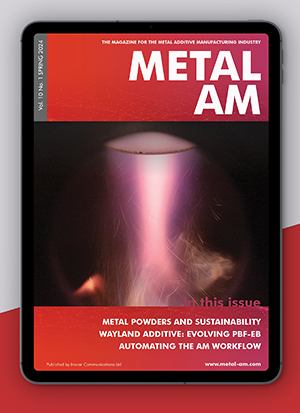FKM Additive Manufacturing adds Dimensionics Density technology to automate AM process
September 5, 2023

Dimensionics Density, a division of Dimensionics GmbH based in Baden-Württemberg, Germany, has announced that FKM Additive Manufacturing, Biedenkopf, reportedly Germany’s largest full-service Powder Bed Fusion (PBF) Additive Manufacturing bureau, has invested in the company’s automatic density determination technology, with the goal of offering a fully automated AM process chain for its customers.
By automating tasks such as part design optimisation, slicing, material handling, building, post-processing, and validation through the use of automated density determination technologies, manufacturers and sub-contract manufacturers like FKM can reduce human error, increase production speed, ensure higher precision, and maintain quality control, explains Dimensionics Density. The streamlining of the entire workflow not only accelerates production but also facilitates the creation of complex geometries, reduces waste, and lowers costs, making Additive Manufacturing more viable for industries while maintaining product integrity and reproducibility.
Philipp Pruesse, Head of Sales at Dimensionics Density, shared, “FKM’s investment in our density determination technology shows that leading players in the AM sector recognise the disruptive nature of our solution when it comes to quality control in real AM production environments. For AM to continue to disrupt the manufacturing paradigm, the entire AM process chain needs to move towards automation. Because of this, our density determination solutions are fully automated, and of vital importance, are designed to be used in busy production settings, not just in the laboratory.’”
“As we all know, AM stimulates design freedom as it is agnostic to part complexity. As geometric complexity increases, density determination of AM parts becomes more difficult using commonly used density determination technologies,” Pruesse continued, “Dimensionics Density’s solutions can easily determine the density of freeform parts and highly complex AM parts in production settings and can measure density repeatably to 0.001 g/cm3.”
FKM has extensive experience in AM and covers the entire AM process chain, including design, powder characterisation, parameter optimisation, and a range of post-process activities such as part colouring.
Stefan Behlert, Head of Quality at FKM added, “As more and more of our customers look to AM as a production technology, it is increasingly important for us to optimise an array of strict quality control processes, giving confidence in outcomes, and therefore cementing customer relationships. Considering the large number of build jobs and parts that we are producing every day, the need arises for a speedy and precise non-destructive density determination testing technology for AM. After studying the report on measurement methods for density determination in AM which was conducted by the Fraunhofer IAPT in Hamburg, we decided to assess Dimensionics Density’s technology. In order to verify the technology, Dimensionics Density offered free testing of samples and the calculation of an ROI according to the number of samples FKM aims to measure each year. Both delivered convincing results which led to an order of one machine for the quality laboratory at FKM.”
FKM has customised its density determination machine to measure not only the density of cubes, but also tensile rods and finished build jobs that are not too large. This will enable FKM to streamline its quality assurance process and utilise employee time more efficiently on behalf of its customers.
Pruesse concluded, “Automatic density determination of AM parts offers significant benefits to the utilisation of 3D printing as a production technology as FKM has recognised. Our ground-breaking technology enables companies to validate significant volumes of production parts manufactured through AM by providing rapid and non-destructive quality assessment. By automating the measurement of part density, companies like FKM can ensure consistent material properties, identify defects or inconsistencies early in the production process, and maintain stringent quality standards. This capability not only reduces the need for manual inspection and testing but also enhances the reliability and confidence in using AM for volume production, ultimately accelerating time-to-market and optimising overall manufacturing efficiency which as a company is our ultimate goal.”
Download Metal AM magazine

















